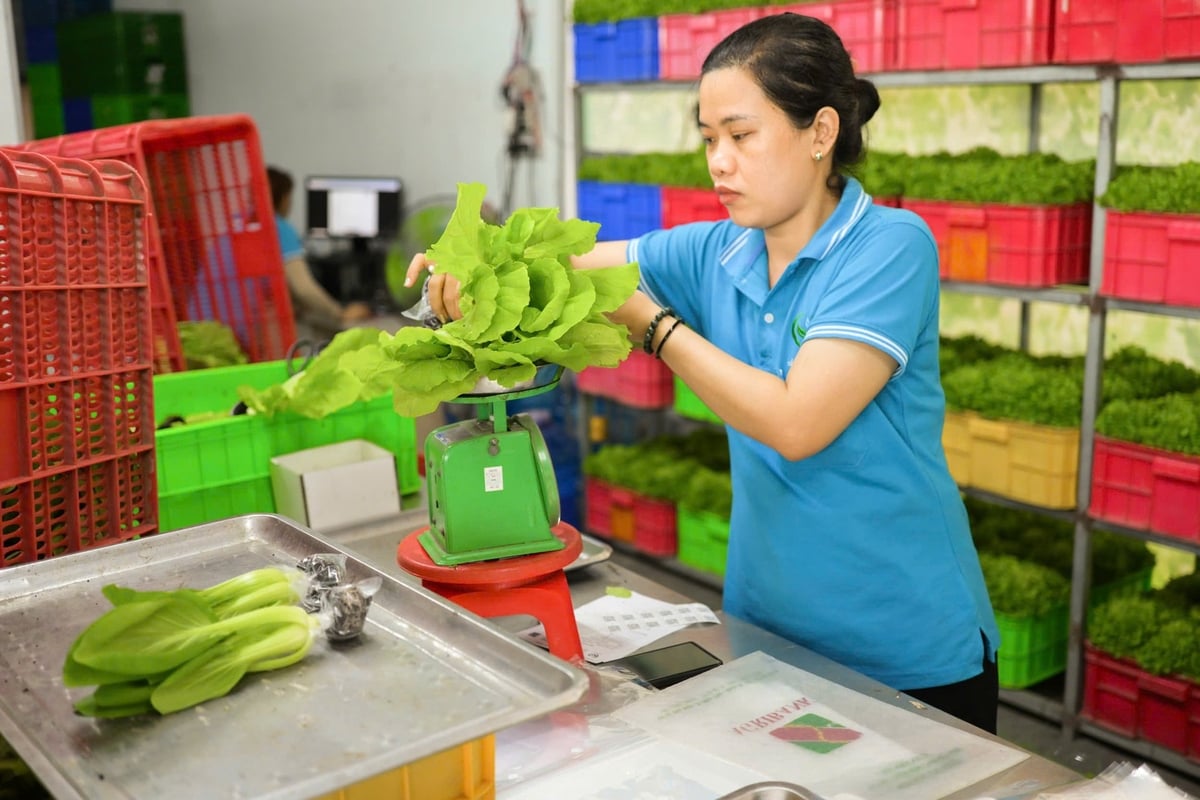December 31, 2025 | 23:14 GMT +7
December 31, 2025 | 23:14 GMT +7
Hotline: 0913.378.918
December 31, 2025 | 23:14 GMT +7
Hotline: 0913.378.918
On July 15, Dr. To Thi Thuy Trang, a member of the research team, emphasized the necessity of an accurate assessment of the current state and capacity of each sector for green transition in order to achieve greenhouse gas emission reductions and climate change adaptation goals. The workshop was co-organized by the Ho Chi Minh City Institute for Development Studies. One of these fields is agriculture, which necessitates customized strategies that are appropriate for the unique natural conditions and diverse production models of the region.

Hydroponic vegetables - a typical model of urban green agriculture in Ho Chi Minh City. Photo: Ha Duyen.
According to Dr. Trang, agriculture in the new Ho Chi Minh City encompasses a wide range of forms—from urban and coastal agriculture to forestry and aquaculture. However, the extent of the implementation of high technology, circular economy practices, or renewable energy in green agriculture is restricted. This is primarily attributable to the absence of specific incentive mechanisms, the difficulty in accessing green finance, and the fragmentation of production.
The city must establish verifiable data and measurable impact-based criteria for the development of "smart and low-carbon" agriculture between 2025 and 2030. “Green agricultural transition cannot remain a slogan. We need clear indicators to know where we stand, what needs to improve, and who needs to act”, said Dr. Trang.
Ho Chi Minh City has already initiated the process of constructing a green transition assessment framework that comprises 10 primary pillars, among which agriculture is a critical element. The toolkit's objective is to assess each sector's greening capacity, including the implementation of advanced technologies, value chain efficiency, resilience to extreme climate events, and emission reductions. However, Dr. Trang noted that the toolkit is merely a technical instrument; its effectiveness depends greatly on local implementation capacity and proactive change from farmers and businesses.
Associate Professor Phan Thi Thuc Anh of VinUni advised against considering the toolkit as a rigid template. She underscored the significance of each locality's use of data to inform policy adjustments, allocate investment, and support successful models.
From a market perspective, Professor Edmund Malesky of Duke University (USA) argued that sustainable green practices in agriculture must be driven by both policy and consumer demand. His surveys conducted in ASEAN countries demonstrated that businesses are inclined to invest in green technologies when there are clear market signals and consistent policy commitments from the government.
In the interim, a number of circular models have begun to emerge in peri-urban rural areas, including the substitution of chemical pesticides with biological agents, the repurposing of agricultural byproducts, and the utilization of rooftop solar power. Nevertheless, these initiatives are largely spontaneous, lack value chain integration, and are challenging to scale without systematic investment from management authorities.
Professor Malesky further emphasized that no one-size-fits-all solution can be applied to all businesses in the green transition process. Rather, policies should be categorized according to the unique characteristics of various business sectors. For foreign companies, especially those targeting Vietnam’s domestic market, stronger regulation and inspections may be effective. In contrast, domestic firms with export ambitions tend to respond better to social and market pressures, such as transparency requirements and global environmental standards. Meanwhile, small and scattered enterprises should not be the focus of broad inspections due to high monitoring costs and low effectiveness; rather, tailored support and guidance policies are more appropriate.
Translated by Linh Linh
/2025/12/29/0829-2-000508_274.jpg)
(VAN) Hai Phong is tightening management, with 100% of fishing vessels licensed and equipped with vessel monitoring systems, joining the national effort to lift the EC's 'yellow card.'
/2025/12/27/2744-1-121716_241.jpg)
(VAN) The Viet Nam Environment Protection Fund is the national environment protection fund and a state financial institution under the Ministry of Agriculture and Environment.
/2025/12/27/2015-2-111213_813.jpg)
(VAN) In efforts to realize the goal of Net Zero emissions, reducing urban emissions is regarded as a key solution.

(VAN) Deputy Prime Minister Tran Hong Ha requested to design the EPR mechanism toward a circular economy that is transparent, feasible, and non-administrative and aligned with actual recycling capacity.

(VAN) On December 24, Deputy Prime Minister Tran Hong Ha chaired a meeting about approving greenhouse gas emission quotas for 2025 - 2026 period.

(VAN) As Viet Nam enters a new era, the national agricultural sector must proactively adapt to global trends to transform current challenges into strategic development opportunities.
/2025/12/18/5046-3-154320_307.jpg)
(VAN) Granting planting area codes is a solution that helps Lao Cai manage forests effectively while also laying a data foundation to support the development of the carbon credit market in the future.